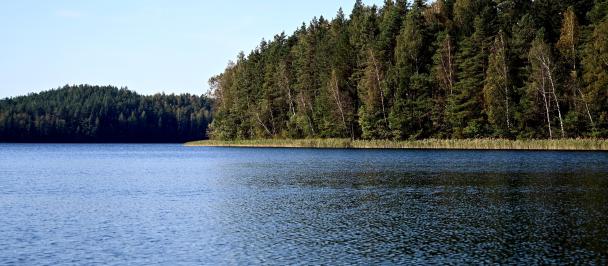
Rod Khattabi uses financial investigations to fight the illegal wildlife trade.
Rod Khattabi is the Chief Accountability Officer and the Justice Initiative director for Grace Farms Foundation. He has background in US federal law enforcement and has investigated money laundering, counterterrorism, narcotics, organized crime, trade secrets, and commercial fraud. The Grace Farms Foundation justice initiative combats illegal wildlife and human trafficking.
UNDP spoke to him to mark World Wildlife Day.
Why did you start using financial investigations to fight the illegal wildlife trade?
I went to South Africa in 2016 with my friend Mark Fowler. His father was Jim Fowler, who co-hosted the popular television series, Mutual of Omaha’s Wild Kingdom, and he suggested going to Kruger National Park. When we got there, I saw some animal killings, and then we were talking with the South African police about what happened and they said; ‘You might want to work to help us out. You could work on wildlife trafficking because you have this experience in fighting organized crime and those skills could help us’.
What do financial investigations have to do with illegal wildlife trafficking?
There's a lot of money in wildlife trafficking.
The poachers are bad guys in one sense, but some of them are just surviving, trying to make a living. They're not doing it because they want to do it. They do it for the money. It's all about money.
The major culprits are the ones that are making tons of money on the illegal wildlife trade. And that's the reason you have to be involved in a financial investigation. To find those that are at the top of this organized crime. Those are the ones that set this up. They set up schemes, routes, they launder the money either through couriers, through trade-based money laundering, and since it involves such gigantic amounts of money, you have to go after that. They're more afraid of their assets being seized than being in prison because they know even when they’re in prison, they can still function. But if you take the money, you disrupt the whole flow. You disrupt the whole organization and hopefully you will eliminate this organization.
Seizing assets is a real disincentive. Stopping the illegal wildlife trade through trafficking cases is very hard. You can't arrest your way out of this, it's impossible. You need to involve financial investigative units. You need to work on long term investigations. You also need to involve the community. If you're not going to do that, you are just not resolving the problem.
Can you share an example?
One is the Queen of Ivory case in Tanzania, as a mentor and advisor, I helped the National Anti-Poaching Unit of Tanzania work through financial investigation with locating assets and being able to prove beyond any reasonable doubt that that money came from illicit gain. And that helped a lot because the Tanzanian government was able to seize properties and money. Robert Mande - that's his team who did the case - they are the ones who deserve all the credit. It was a major investigation that went on for years and they were able to trace the money through different methods: disbursement, analysis, deposits, and being able to make the link through interviews, cooperating defendants or witnesses, and being able to put the case together and get probable cause to seize those assets.”

Training law enforcement officers to fight wildlife trafficking.
How important are partnerships to you?
Every country has a different context, so you cannot expect to have a silver bullet for all. It's really important to bring all stakeholders together. With the training we've been doing with UNDP and USAID, we included prosecutors; it's also really important to bring the judicial side and ensure that judges are also in the mix. We are looking to include judges in future capacity building.
Having the judges be knowledgeable about the crimes, to understand how the world can be affected by wildlife trafficking is paramount. It can help establish uniform sentencing and help them understand that what you are sentencing is not just the killing of one animal. What you are really sentencing is the damage that wildlife trafficking can do.
What gives you hope?
I do have hope, otherwise I wouldn't be doing this. It's a long race. You'll get small victories and you keep going. Every win you have against evil is important. I always say ‘you save one life, you've done a lot’. So if you can save one animal and disrupt organized crime, you've done a lot. And if we all get together, that's the call to action – work together. I will leave you with one thought/question: Can you imagine a world without wildlife?
Rod Khattabi serves as Chief Accountability and Justice Initiative Director for Grace Farms Foundation. He is responsible for all programmes aligned with the mission to end modern day slavery, gender-based violence, and environmental crimes, through effective policy, capacity building, and advocacy. In partnership with the USAID-UNDP-GEF project Reducing Maritime Trafficking of Wildlife between Africa and Asia under the GEF-financed, World Bank-led Global Wildlife Program and with additional funding provided by the United Stated Agency for International Development (USAID), Rod has provided criminal investigation training to law enforcement officers in Kenya, Tanzania, and Uganda.

 Locations
Locations






















